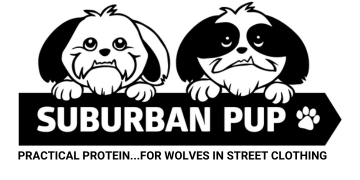Dinnertime in the d0gh0use!

I've known Nat from d0gh0use since 2019, first as owner/curator of her undertatedly-stylish Newrybar pup-cessories store, then as SP client/Mum to rescue dachsie and IVDD survivor Bunny. More recently, the ladies + fam have moved to the Gold Coast and launched d0gh0use Sessions behaviour training for small dogs, where Nat's empathy and kindness are palpable - and which in turn got us chatting about the links between healthy food and healthy behaviour! So to keep celebrating Queensland Small Business Month, I asked lovely Nat five quick questions to share with our SEQ community…
Big question to start - what are the essentials that every happy, healthy suburban pup needs?!
Aside from all the practical items, the most important essentials that contribute to quality of life in my opinion are the physical and mental health and wellness of a dog…appropriate nutrition to thrive, and comfort and support to feel confident, secure and safe throughout their lifetime.

How has the way you feed your own pups changed over the years, esp during Bun’s IVDD recovery period/s?
Food as nourishment was ingrained in me from a very young age and I approach my dogs' nutrition the same way. I've always fed my animals real food, as opposed to ultra processed varieties, but the availability of ready made meals these days is a game changer for us.
Each dog is an individual, all my dogs eat real food but not the same food. 2 dogs are not 1 dog…it's finding what agrees with each dog, what do they like, what don’t they like. Like us, our dogs are prone to food intolerances, allergies and they have preferences. If your dog is not eating a particular protein or vegetable it is likely for good reason. I’m also very conscious of the life stage of my dogs and their energy and nutritional requirements. As dogs age they can become less active, this had been the case with Bunny when prescribed 8 weeks crate rest for her back recovery which meant she wasn’t active at all, so her food intake had to be adjusted and supplements increased to keep her nourished and at a healthy weight.
And how have you seen food choices help support lifelong behaviour?
We are what we eat and its not different for our dogs. What your dog eats fuels their behaviour for better or worse. If your dog feels good, has a healthy gut, healthy mind, clean teeth and gums, good skin, a zest for life free from avoidable pain and discomfort...all these factors impact their lifelong behaviour.
Bunny turned 12 years old last week and she’s often mistaken for a puppy. We keep her weight optimal, she has regular health checks, enough rest and quality sleep, and this is supported by a dog-appropriate real food diet with a variety of proteins, fruits and vegetables.

Can you give us an example of how food changes have supported the learning of your clients?
With positive reinforcement we use food to foster a relationship and build positive associations, so the dog's relationship with food is an important part of the picture.
I've had experience with many dog clients who previously were not interested in food during training or they’re what many label a ‘fussy’ eater. When I hear this it indicates that the dog maybe too overwhelmed in a given situation to eat or they’re trying to communicate a problem with the food…the food doesn't agree with them, they don’t like it or they associate it with a negative experience. If food is used incorrectly such as to bribe or trick a dog into something they fear, it can create an aversion to that particular food or treat. Starting from the beginning to build confidence and positive associations with food the dog is into is the first step before any learning can occur.
Another common physical issue I see as potentially impacting a dog's behaviour is allergies resulting in chronic itching and discomfort. Imagine being itchy all the time and how this would impact your ability to function day to day…I don’t know about you, but my ability to cope with life would be impacted, making me more likely to over react or shut down. Research is telling us its the same for our dogs.
It's important to note that eating is a behaviour, an essential one for survival, so when a dog isn’t a reliable eater, it's a welfare indicator that needs to be addressed before any training plan can start.
How, when and where you feed your dog can be just as important as what you feed them…it may not be the food at all, but how its being presented to the dog. I’ve worked with dogs who prefer to take treats from the ground as opposed to someone's hand or a bowl…it depends on the individual dog.
Tell us a little about being a small business owner in the SEQ/NNSW dog community?
Its been a tumultuous time, I opened d0gh0use store a few months before the pandemic hit so that wasn’t ideal. I’m grateful that I’m part of a retail collective which made the whole experience a shared one with other local small businesses, carrying each other through it all. Then there were the floods which really made me question whether it was worth continuing with retail.
I also provided a hotel service during this time for small breeds in my home and I met and cared for some special little dogs which lead me to study dog behaviour further and launch a consulting service as part of d0gh0use.
Now based on the Gold Coast, I still have my store space at Newrybar Merchants but my focus is on d0g0use Sessions behaviour and training, specifically working with aggression in small dogs servicing the Northern Rivers up to Brisbane and remotely.

All photos courtesy d0gh0use website + instagram which we highly recommend following for more behaviour insights.
Also in ENEWSFLASH FEATURES

Where longevity meets wellness




